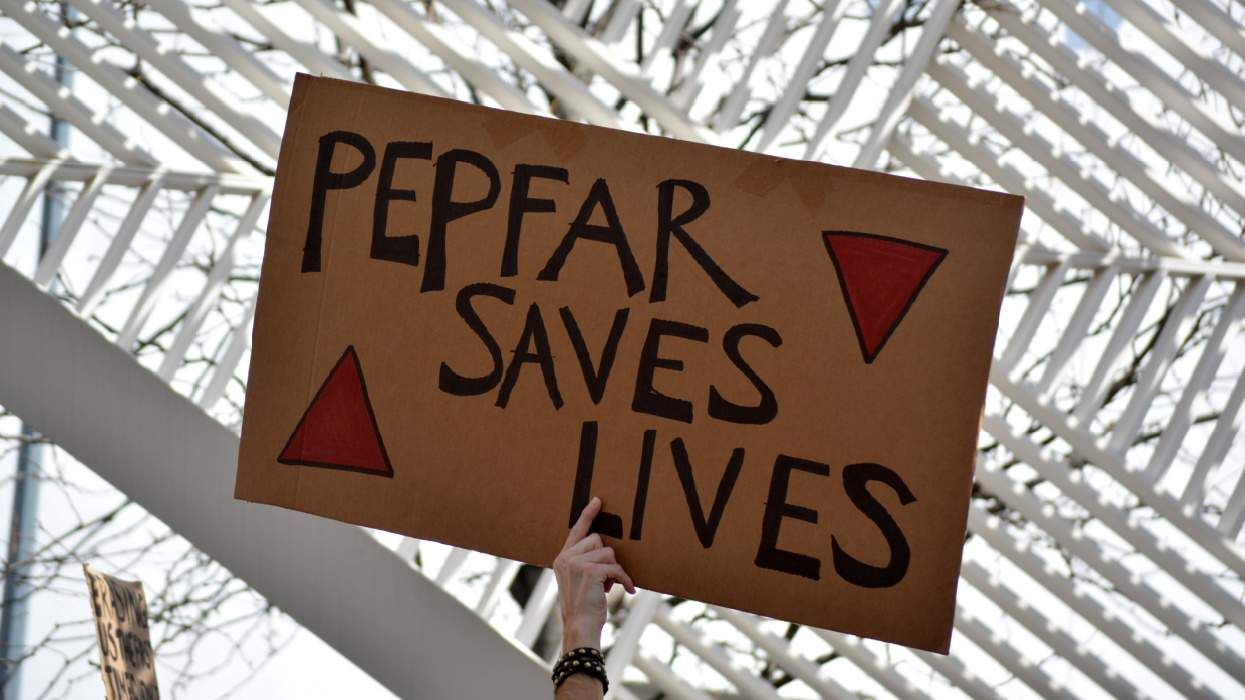June 20 2006 12:00 AM EST
CONTACTAbout UsCAREER OPPORTUNITIESADVERTISE WITH USPRIVACY POLICYPRIVACY PREFERENCESTERMS OF USELEGAL NOTICE
© 2025 Equal Entertainment LLC.
All Rights reserved
All Rights reserved
By continuing to use our site, you agree to our Privacy Policy and Terms of Use.
We need your help
Your support makes The Advocate's original LGBTQ+ reporting possible. Become a member today to help us continue this work.
Your support makes The Advocate's original LGBTQ+ reporting possible. Become a member today to help us continue this work.
Mutations in a single gene may have turned the AIDS virus from a fairly benign infection of monkeys and apes into a global pandemic that has killed more than 25 million people in 25 years, researchers say. The virus in humans appears to have lost a genetic characteristic that protected the immune system in apes and monkeys, the researchers report in this week's issue of the journal Cell.
"The observed difference in Nef function may provide--for the first time--a mechanism to explain why many monkey species naturally infected with SIV do not develop disease," said Frank Kirchhoff of the University of Ulm in Germany, who helped lead the study.
Beatrice Hahn of the University of Alabama at Birmingham had earlier shown that the human immune deficiency virus, or HIV, descended from a chimpanzee virus called simian immunodeficiency virus, or SIV.
Many species of monkeys and chimps are infected with various strains of SIV, and it almost never causes disease. But HIV destroys the human immune system, leading to AIDS and usually death. There is no cure or vaccine.
Working with colleagues in Germany, Gabon, and elsewhere, Kirchhoff and Hahn's team focused on a protein and a gene called nef, found in all SIV and HIV strains. In SIV it helps ratchet down the activation of T-cells. These immune system cells are key to protection against disease, and HIV selectively infects T-cells known as CD4 helper T-cells.
In HIV infection, these T-cells destroy themselves in a process known as programmed cell death or apoptosis. But the SIV version of the virus seems to somehow shut off the death function.
"The findings suggest that the gene function was lost during viral evolution in a lineage that gave rise to HIV-1 and may have predisposed the simian precursor of HIV-1 for greater pathogenicity in humans," the researchers wrote.
This finding could open the door to new ways of treating HIV, they said.
"A strong immune response can be good in the short term, but if sustained for a long time as in those with HIV, it can exhaust the immune system," Kirchhoff said. "If you could somehow dampen the response, it might effectively convert the condition to the more chronic, asymptomatic infection seen in monkeys." (Reuters)
From our Sponsors
Most Popular
Bizarre Epstein files reference to Trump, Putin, and oral sex with ‘Bubba’ draws scrutiny in Congress
November 14 2025 4:08 PM
True
Jeffrey Epstein’s brother says the ‘Bubba’ mentioned in Trump oral sex email is not Bill Clinton
November 16 2025 9:15 AM
True
Watch Now: Pride Today
Latest Stories
Japan's ban on marriage equality is constitutional, according to a Tokyo court
November 28 2025 4:59 PM
How a queer fashion show took on New York Fashion Week
November 28 2025 4:58 PM
8 LGBTQ+ films coming in 2026 that we can't wait to see
November 28 2025 12:00 PM
Lavender marriages: What queer unions and relationships can teach us about love and safety
November 27 2025 9:43 PM
How a united message of 'Tax the Rich' could make life more affordable, and win elections
November 27 2025 8:00 AM
Trump administration won't observe World AIDS Day
November 26 2025 5:34 PM
Psychiatrist explains the Kinsey scale to two men and blows their minds
November 26 2025 3:30 PM
Funding cuts could cause 3.3 million additional HIV infections by 2030: report
November 26 2025 11:01 AM
Florida driver arrested and accused of trying to run over LGBTQ+ running group
November 26 2025 10:56 AM
Democrats and rights groups accuse Trump's Justice Department of ignoring hate crimes
November 26 2025 9:45 AM
How the Boy Scouts became a target of the Trump administration's wrath
November 25 2025 6:08 PM
Trump can't have 'Defying Gravity' or 'holding space,' says queer media's Tracy E. Gilchrist
November 25 2025 5:27 PM
Trending stories
Recommended Stories for You




































































Charlie Kirk DID say stoning gay people was the 'perfect law' — and these other heinous quotes